The main goals of investing in bonds, as opposed to stocks, are capital preservation (preventing yourself from losing money) and income generation.
5. High-yield savings accounts
Savings accounts offered by branch-based banks are notorious for paying minuscule interest rates.
On the other hand, some excellent banks, primarily based online, offer very competitive rates -- to the point that they can be considered investment-worthy in many cases. As of October 2025, savings account interest rates in the 4% ballpark are still readily available if you do a little research.
6. Certificates of deposit (CDs)
Many reputable banks offer excellent high-yield certificates of deposit (CDs). These pay guaranteed yields for anywhere from a few months to five years or more.
Unlike savings accounts, CDs allow you to lock in a specific yield for a set period. This can be an especially valuable feature when interest rates are relatively high, and you want predictable returns.
The Federal Deposit Insurance Corp. (FDIC) insures CDs and savings accounts up to $250,000 per person per bank to protect you against bank failure.
7. Real estate
Like owning great companies, owning real estate can be a wonderful way to build wealth. In most recessionary periods throughout history, commercial real estate has performed rather well. It's often viewed as a safer, more stable investment than stocks.
There are ways for people at almost every financial level to invest in and make money from real estate. The most obvious is to buy a rental property, which can be a great way to build wealth and create an income stream. However, this isn't the best fit for everyone.
Fortunately, there are alternative ways to invest in real estate. Many, such as real estate investment trusts (REITs), are much more passive than actually becoming a landlord.


